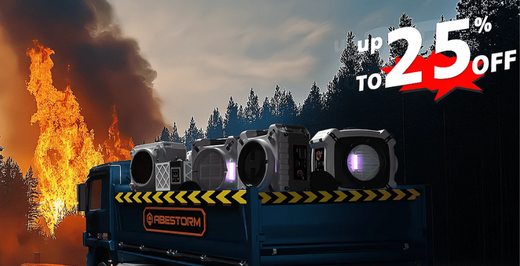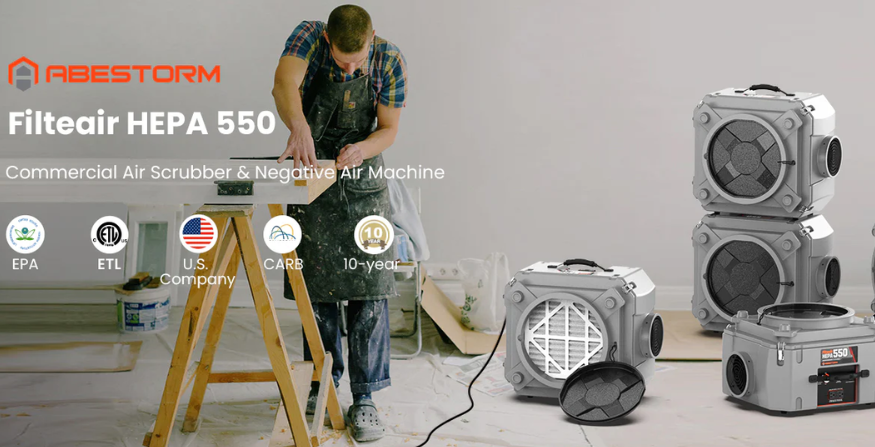While all the available dehumidifiers on the market work efficiently to reduce the humidity level of your house, a desiccant dehumidifier is an ideal choice for a wide range of spaces. Maintaining the right humidity levels in various spaces is crucial for preventing mold, mildew, and other moisture-related issues. Whether you're looking to protect your basement, garage, or commercial space, a reliable dehumidifier is essential. Among the different types of dehumidifiers, desiccant dehumidifiers stand out for their efficiency and versatility. In this blog, we'll explore what a desiccant dehumidifier is, how it works, and why it might be the best choice for your needs. We'll also cover the benefits of desiccant dehumidifier rentals, their commercial and industrial applications, and whether desiccant dehumidifiers heat the room.
What is a Desiccant Dehumidifier?
A desiccant dehumidifier is a type of dehumidifier that uses a desiccant material, such as silica gel, to absorb moisture from the air. Unlike refrigerant dehumidifiers, which rely on cooling coils to condense moisture, desiccant dehumidifiers work by attracting and retaining moisture through a drying agent. This process makes them highly effective in environments with low temperatures and low humidity levels.
Desiccant dehumidifiers are particularly useful in spaces where traditional refrigerant models might struggle. For example, a desiccant dehumidifier for basement can be more effective during cold months when refrigerant models lose efficiency. Additionally, a desiccant dehumidifier for a garage can help maintain optimal humidity levels, protecting tools and stored items from rust and corrosion.
The best desiccant dehumidifier models are known for their compact and lightweight design, making them easy to move and install in various locations. They are also quieter than many refrigerant models, providing a more pleasant environment for residential and commercial applications.
In commercial settings, desiccant dehumidifiers are invaluable. A commercial desiccant dehumidifier can handle large volumes of air and is ideal for warehouses, storage facilities, and other industrial applications. For those who need a temporary solution, desiccant dehumidifier rentals offer a cost-effective way to manage humidity without a long-term commitment. Now you must be clear about ‘what is a desiccant dehumidifier’.
How a Desiccant Dehumidifier Works
Detailed Explanation of the Working Mechanism
A desiccant dehumidifier for basement operates using a unique method that sets it apart from traditional refrigerant dehumidifiers. The core component of a desiccant dehumidifier is the desiccant material, often silica gel, which has a high affinity for water molecules. Here's a step-by-step breakdown of how a desiccant dehumidifier works:
Air Intake: The unit draws in moist air from the environment through an intake fan.
Moisture Absorption: The moist air passes over a desiccant wheel or rotor filled with desiccant material. The desiccant absorbs the moisture from the air, leaving the air dry.
Regeneration: The desiccant material eventually becomes saturated with moisture. To continue the dehumidification process, the saturated desiccant is moved to a regeneration zone.
Heating and Drying: In the regeneration zone, the desiccant is heated, causing the absorbed moisture to evaporate. This process regenerates the desiccant material, allowing it to absorb moisture again.
Moisture Expulsion: The evaporated moisture is expelled from the unit as warm, moist air, often through an exhaust vent.
Circulation of Dry Air: The dehumidified air is then circulated back into the room, effectively reducing the overall humidity level.
Components and Process
Desiccant Wheel/Rotor: This rotating component contains the desiccant material and is critical for the moisture absorption process.
Air Intake and Exhaust Fans: These fans draw in moist air and expel humid air, ensuring continuous air circulation.
Heater: Used to heat the desiccant material for the regeneration process.
Control System: Allows users to set desired humidity levels and control the operation of the unit.
Benefits of Using a Desiccant Dehumidifier
Effective Moisture Removal in Low Temperatures
One of the primary advantages of desiccant dehumidifiers is their efficiency in low temperatures. Traditional refrigerant dehumidifiers struggle in colder environments because their coils can freeze, reducing their ability to condense moisture. Desiccant dehumidifiers, however, remain effective even in temperatures as low as 36°F, making them perfect for use in basements and garages during winter months.
Compact and Lightweight Design
Desiccant dehumidifiers are generally more compact and lighter than their refrigerant counterparts. This makes them easier to transport and install in various locations, including tight spaces. Their portability is particularly beneficial for those needing a flexible dehumidification solution, such as desiccant dehumidifier rentals for temporary use in different areas. A desiccant dehumidifier for garage is an ideal choice for you.
Quiet Operation
Another significant benefit of desiccant dehumidifiers is their quiet operation. Unlike refrigerant models that rely on compressors, desiccant dehumidifiers use fans and desiccant wheels, which generate less noise. This makes them suitable for residential areas where noise levels need to be minimized, such as in homes or small offices.
Specific Advantages for Basements and Garages
Basements: A desiccant dehumidifier for basement can effectively manage humidity levels, prevent mold growth and protecting stored items from moisture damage. Their ability to operate efficiently in low temperatures makes them ideal for these typically cooler spaces.
Garages: Using a desiccant dehumidifier for garage helps maintain a dry environment, protecting tools, vehicles, and other stored items from rust and corrosion. The compact design and quiet operation ensure that they do not disrupt daily activities in the garage.
Commercial and Industrial Applications
Importance in Commercial Settings
Commercial desiccant dehumidifier plays a critical role in commercial and industrial settings where maintaining low humidity levels is essential for operations and product integrity. High humidity can lead to mold growth, corrosion, and deterioration of products and machinery. Commercial desiccant dehumidifiers are ideal for these environments due to their efficiency in low temperatures and their ability to handle large volumes of air.
Examples of Industries and Environments
Desiccant dehumidifiers are commonly used in:
Pharmaceuticals: Maintaining dry conditions is crucial for the production and storage of medicines.
Food Processing: To prevent spoilage and ensure the longevity of perishable goods.
Manufacturing: To protect machinery and raw materials from moisture damage.
Warehousing: To safeguard stored products from humidity-related deterioration.
Construction: To dry out new buildings and prevent mold growth during the construction process.
Highlight Abestorm's Commercial Dehumidifiers
Abestorm offers robust commercial dehumidifiers designed to meet the demands of various industries. For instance, the Abestorm 110 Pints Commercial Dehumidifier is an excellent choice for large workplaces, offering high capacity and efficient moisture removal.
Desiccant Dehumidifier Rental
Situations Where Renting is Beneficial
Renting a desiccant dehumidifier is a practical solution in scenarios where temporary moisture control is needed, such as:
Post-flood recovery: To quickly dry out affected areas.
Construction projects: To control humidity during building.
Events: To maintain a comfortable environment in temporary setups.
Short-term commercial needs: To address seasonal humidity spikes.
Do Desiccant Dehumidifiers Heat the Room?
A very common question about desiccant dehumidifiers is “Do desiccant dehumidifiers heat the room”.
Explanation of the Heating Effect
Desiccant dehumidifiers work by passing air over a desiccant material, which absorbs moisture. During the regeneration phase, the desiccant is heated to release the absorbed moisture, and this process can introduce warm air back into the room. This heating effect is generally mild but noticeable.
How it Compares to Other Types of Dehumidifiers
Unlike refrigerant dehumidifiers, which can cool the air slightly as they remove moisture, desiccant dehumidifiers tend to warm the air. This can be advantageous in colder environments where additional heating is beneficial.
Situations Where This is Advantageous
The heating effect of desiccant dehumidifiers is beneficial in:
Basements and crawl spaces: Where temperatures are typically lower.
Winter months: When additional warmth is welcome.
Cold storage facilities: To maintain dry conditions without further cooling the space.
Choosing the Best Desiccant Dehumidifier
Key Features to Look For
When selecting a desiccant dehumidifier, consider the following features:
Capacity: Ensure it can handle the size of the space.
Energy efficiency: Look for models with energy-saving features.
Noise level: Consider how quiet the unit operates.
Portability: If you need to move the dehumidifier between locations.
Smart controls: For remote monitoring and adjustments.
Recommendations for Basements, Garages, and Commercial Use
Basements: The Abestorm 120 Pints Crawl Space Dehumidifier is ideal for large basements due to its high capacity and efficient performance.
Garages: The Abestorm 110 Pints Commercial Dehumidifier provides robust moisture control, making it perfect for garages.
Commercial Use: The Abestorm 120 Pints Guardian SN55 Crawl Space Dehumidifier offers high efficiency and durability for demanding industrial environments.
Conclusion
Maintaining the right humidity levels is essential for preventing mold, corrosion, and other moisture-related issues in both residential and commercial spaces. Desiccant dehumidifiers offer an effective solution, especially in low-temperature environments. By understanding how these units work and their benefits, you can make an informed decision on the best desiccant dehumidifier for your needs.
Ready to Take The Control of Humidity in Your Own Hands?
Visit Abestorm today to explore our range of desiccant dehumidifiers and find the perfect solution for your humidity control needs. Whether you need a powerful unit for your basement, garage, or commercial space, our expert team is here to help you make the best choice. Shop now and protect your space from moisture damage with a high-quality desiccant dehumidifier from Abestorm.









Shop For Dehumidifier